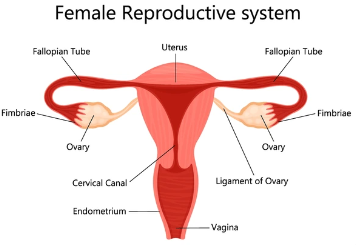During pregnancy, the uterus undergoes significant changes to accommodate the growing fetus. However, certain disorders can affect the uterus and potentially impact the course of the pregnancy. Understanding these disorders, their symptoms, and management options is crucial for maintaining maternal and fetal health. Here’s an overview of common uterine disorders in pregnancy:
Uterine Fibroids
- Definition and Causes:
- Uterine fibroids are non-cancerous growths that develop in the muscle tissue of the uterus. They are common and may grow larger during pregnancy due to increased estrogen levels.
- Symptoms:
- Pelvic Pain: Discomfort or pain in the pelvic region.
- Heavy Bleeding: Excessive bleeding or spotting, especially in the first trimester.
- Frequent Urination: Increased pressure on the bladder can lead to more frequent urination.
- Back Pain: Lower back pain due to pressure from fibroids.
- Management and Treatment:
- Monitoring: Regular ultrasounds to monitor the size and impact of the fibroids on pregnancy.
- Pain Relief: Over-the-counter pain relievers, as recommended by your healthcare provider.
- Delivery Considerations: In some cases, fibroids may require a cesarean section if they obstruct the birth canal.
Placenta Previa
- Definition and Causes:
- Placenta previa occurs when the placenta is positioned low in the uterus and covers part or all of the cervix. It can cause complications during delivery.
- Symptoms:
- Vaginal Bleeding: Painless bleeding, especially in the second or third trimester.
- Pelvic Pressure: Feeling of pressure or fullness in the pelvic area.
- Management and Treatment:
- Monitoring: Regular ultrasounds to check the position of the placenta.
- Rest: Reducing physical activity and avoiding sexual intercourse to prevent bleeding.
- Delivery Planning: In cases where placenta previa persists, a cesarean section may be required to ensure a safe delivery for both mother and baby.

Uterine Contractions
- Definition and Causes:
- Uterine contractions are normal during pregnancy, but premature or excessive contractions can indicate potential issues such as preterm labor.
- Symptoms:
- Regular Contractions: Frequent, regular contractions before 37 weeks of pregnancy.
- Lower Abdominal Cramping: Cramping or pain in the lower abdomen.
- Lower Back Pain: Persistent lower back pain accompanying contractions.
- Management and Treatment:
- Hydration and Rest: Increasing fluid intake and resting can help reduce premature contractions.
- Medication: Tocolytics may be prescribed to help stop premature labor.
- Monitoring: Regular prenatal visits to monitor the frequency and intensity of contractions.
Uterine Septum
- Definition and Causes:
- A uterine septum is a congenital abnormality where a fibrous or muscular partition divides the uterus into two sections. It can impact pregnancy by increasing the risk of miscarriage or preterm birth.
- Symptoms:
- Miscarriages: Increased risk of recurrent miscarriages or early pregnancy losses.
- Preterm Labor: Higher risk of preterm labor and delivery.
- Management and Treatment:
- Surgical Correction: In some cases, surgery to remove the septum may be recommended before pregnancy or during early pregnancy.
- Monitoring: Regular ultrasounds and monitoring during pregnancy to assess fetal growth and development.
Uterine Rupture
- Definition and Causes:
- Uterine rupture is a rare but serious condition where the uterus tears during pregnancy, often occurring in women with a previous cesarean section or uterine surgery.
- Symptoms:
- Severe Abdominal Pain: Sudden and severe pain in the abdomen.
- Vaginal Bleeding: Significant bleeding from the vagina.
- Fetal Heart Rate Changes: Abnormalities in the fetal heart rate, detected during monitoring.
- Management and Treatment:
- Immediate Care: Immediate medical attention is required if a uterine rupture is suspected.
- Emergency Cesarean Section: An emergency cesarean section is often necessary to deliver the baby and address the rupture.
Conclusion: Disorders of the uterus during pregnancy can affect maternal and fetal health but can often be managed with appropriate care and treatment. Regular prenatal check-ups, timely diagnosis, and effective management are key to addressing these conditions. If you experience symptoms such as unusual bleeding, severe pain, or frequent contractions, consult your healthcare provider promptly. By staying informed and working closely with your healthcare team, you can ensure a healthy and safe pregnancy.
